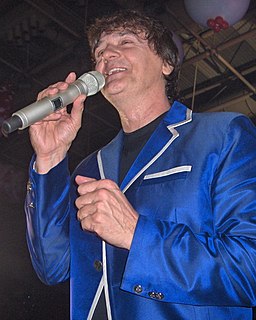
Zdravko Čolić is a pop singer from Bosnia and Herzegovina, widely considered as one of the greatest vocalists and cultural icons of former Yugoslavia. Dubbed the 'Tom Jones' of the Balkans he has garnered notoriety in Southeastern Europe for his emotionally expressive tenor voice, fluent stage presence and numerous critically and commercially acclaimed albums and singles.

Dragana Todorović, known under the stage name Bebi Dol, is a Serbian singer-songwriter and actress. She is recognised as one of the most prominent artists in the 1980s and is best known for representing SFR Yugoslavia on the 1991 Eurovision Song Contest with "Brazil".

Vinko "Vice" Vukov was a Croatian singer and politician.
Croatia’s was represented by Severina Vučković in the Eurovision Song Contest 2006 with the song "Moja štikla" (My stiletto). The song was described as a turbo-folk song with humorous lyrics and Balkan folk motifs. The lyrics were written by Severina, the music by Boris Novković and Franjo Valentić, and arrangement by popular Bosnian-born musician Goran Bregović. Vučković was chosen using the Dora competition in the seaside resort of Opatija, the place where the first Dora was held.

Kaliopi Bukle, known professionally as Kaliopi, is a Macedonian singer-songwriter. In her career, Kaliopi has progressed from singing lead vocal with her eponymous band in 1980s Yugoslavia to being an established vocalist and composer working in North Macedonia and across former Yugoslavia. She represented then Republic of Macedonia twice in the Eurovision Song Contest, first in 2012 in Baku, Azerbaijan with "Crno i belo" and a second time in 2016 in Stockholm, Sweden with the song "Dona".

Kerber is a Serbian and former Yugoslav hard rock band from Niš.
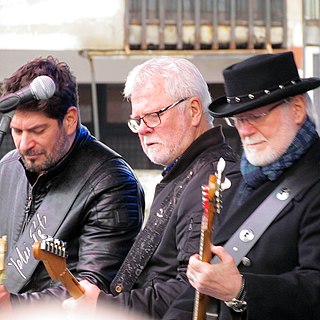
YU Grupa is a Serbian rock band. A pioneer in combining rock music with the elements of the traditional music of the Balkans, YU Grupa is credited with being the longest-lasting Serbian rock band.
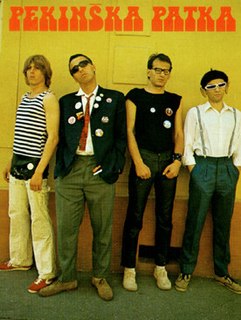
Pekinška Patka is an eminent Serbian and former Yugoslav punk rock band from Novi Sad. Their debut album, Plitka poezija, released in 1980, is considered the first punk rock album by a band coming from Serbia. Being one of the first punk acts in Yugoslavia, they played a major role in opening doors for many bands that came after.
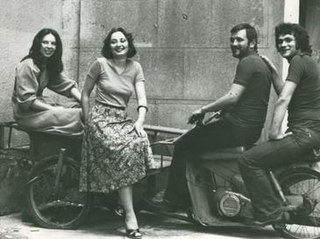
Rani Mraz were a former Yugoslav rock band from Novi Sad, formed in 1977 by former Žetva member Đorđe Balašević. During the initial period, the band went through several lineup changes, until Balašević and female singer Biljana Krstić remained the only official members of the band. The two released two studio albums under the name Rani Mraz, before officially dissolving in 1981.
Kokan Popović is a Serbian drummer notable for playing in bands Idoli and Propaganda.

Korni Grupa was a Yugoslav rock band from Belgrade, also known as the Kornelyans, the name which they used during a short-lived foray into the international market. Formed in 1968, Korni Grupa was one of the first Yugoslav rock bands to achieve major mainstream popularity, and the first Yugoslav supergroup. Korni Grupa is considered to be one of the most prominent and influential bands in the history of rock music in Yugoslavia.

Aleksandra "Slađana" Milošević Hagadone, better known as Slađana Milošević, pronounced [slǎdʑana milǒːʃeʋitɕ], is a Serbian singer-songwriter, composer, record producer, and writer. During the early 1980s, she was one of the leading new wave vocalists in SFR Yugoslavia.
Dža ili Bu are a Serbian punk rock band from Belgrade.

Opatija Circuit, also known as Preluk Circuit and the Kvarner Circuit, was a motorsport street circuit in Opatija, Croatia. The circuit used the city streets of the seaside resort situated on the Kvarner Gulf between 1931 and 1977. It was known as the "Monaco" of the Grand Prix motorcycle racing circuit because of its dramatic views of the Adriatic Sea.
Bisera Veletanlić is a Serbian jazz singer, one of the greatest names of Yugoslav evergreen scene and the star of music festivals in the 1970s. She has been called "one of the most original singers from the Balkans".
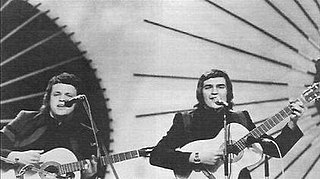
Vlada i Bajka were a Serbian and former Yugoslav acoustic music duo from Belgrade, consisting of Vladimir Marković "Vlada" and Dragutin Balaban "Bajka".
Jugovizija, Cyrillic: Југовизија, English: Yugovision, was the Yugoslav national final to select their entry for the Eurovision Song Contest, organized by the Yugoslav broadcaster Yugoslav Radio Television (JRT) and its subnational public broadcasting centers based in the capitals of each of the constituent republics of the Yugoslav federation: SR Bosnia and Herzegovina, SR Croatia, SR Macedonia, SR Montenegro, SR Serbia and SR Slovenia and also the broadcasting services of the autonomous provinces within SR Serbia: SAP Kosovo and SAP Vojvodina. The first subnational public broadcasters to compete in 1961 were RTV Belgrade, RTV Ljubljana and RTV Zagreb, while the others joined in the following years.

Den Za Den was a Yugoslav jazz rock group from Skopje. Although short-lived, the band is one of the most notable representatives of the Yugoslav jazz rock scene.

Leo Martin is a Serbian and former Yugoslav pop singer. He started his career in the early 1960s in jazz bands as an instrumentalist and vocalist. In 1964, he moved with his band to West Germany to play jazz covers in night clubs. In 1968, while in Germany, he started his solo career by recording an album of pop music in the English language, which made him popular throughout Europe. After touring Europe, he returned to Yugoslavia in 1969 where he established himself as one of the leading schlager singers of the 1970s and 1980s. His career was interrupted by Yugoslav Wars of the 1990s. He has performed sporadically since.
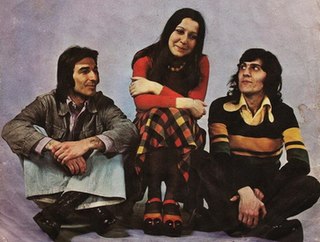
Lutajuća Srca is a Serbian and Yugoslav rock band from Niš.















